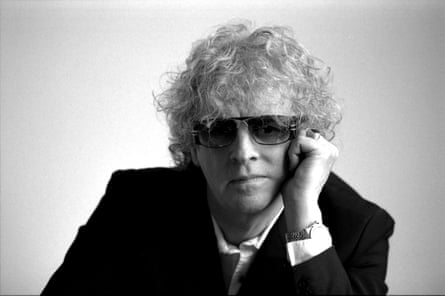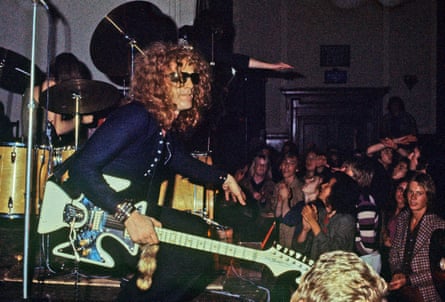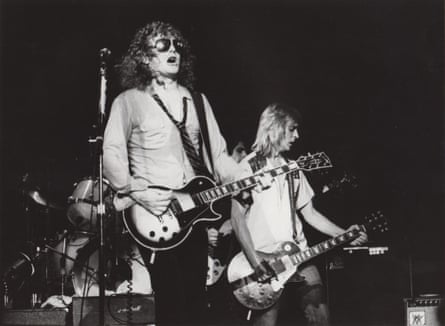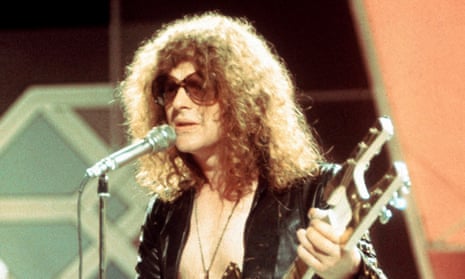It’s November 1972, and Ian Hunter is preparing to leave his home in Wembley, London, to go on a US tour with Mott the Hoople. Mott had their first big hit – All the Young Dudes, written for them by David Bowie – earlier that year, but Hunter’s last-minute chores rather bely the title of the book in which he detailed them, Diary of a Rock’n’Roll Star.
The Guardian’s product and service reviews are independent and are in no way influenced by any advertiser or commercial initiative. We will earn a commission from the retailer if you buy something through an affiliate link. Learn more.
“I cleaned the flat up a bit – mopped the cat shit up from the kitchen floor, had a bath and washed my hair,” he writes. “Pull the TV plug out, pull the fridge plug out; stereo, Revox, hairdryer all pulled out. Send the landlord the advanced rent and settle the red electricity bill before it’s cut off.” Still, while he’s away he’s going to get his car done up in rock’n’roll fashion – spray painted black and gold. Except the car in question is not a Cadillac or a Jag. It’s a Ford Anglia.
Forty-six years later, on the phone from his home in Connecticut, Hunter wonders what he was thinking. “I went down the garage to pick it up, and they looked at me, like, ‘What the fuck have you done?’ It looked ridiculous.” But there was something in Mott that rather prevented them getting the whole rock star thing right. “We were normal people, and we got lucky. I didn’t feel any reason to feel superior, just because I had the gene in me that could write songs.”

Diary of a Rock’n’Roll Star, which has just been reissued, is one of the best books ever written about the actual job of being in a band. It’s not glamorous: there are a lot of buses, planes, hotels and dressing rooms; opening slots where the sound is terrible; gigs cancelled when the promoter has screwed up. It captures the full meaning of Charlie Watts’ mordant description of life in the Rolling Stones: “Five years playing; 20 years hanging around.” The difference being that Mott didn’t have enough money to make the most of the hanging around.
They were rather like a mid-ranking football club: passionately supported, capable of brilliance, but a little ramshackle and inconsistent, and unable to hold on to their best players. The problem was, Mott never got a Bill Shankly or Brian Clough to knock them into shape. “Management for Mott was insane,” Hunter says. “First you had Guy Stevens, who we managed more than he managed. Then you had Tony Defries – it was only because David Bowie [whom he also managed] wanted him to do us that he did it. We were looking at people like Roxy who had steady management – there was a plan. There was no plan with us. It was chaos. And we didn’t know what to do about it. It wasn’t cohesive. Bowie said, ‘You’ve got to lead because it’s not working. You’re not getting any answers to questions.’ The thing is, any decision had to be 5-0 in Mott the Hoople. It couldn’t be 3-2. And there was always one guy who was pissed off, so nothing ever really got done. But the weird thing was we genuinely did love each other.”
He still sounds astonished Bowie took an interest in them – without All the Young Dudes, it is likely Mott would have split in 1972 without a hit and Hunter would not have the reputation, at 79, that enables him to work as a full-time musician still. “Who else at that stage in his career would start giving away time and songs to other people? Which he did with me and Mott, Lou Reed, Iggy. How did he find the time for that? He was extremely ambitious, but still found time to do other things as well, which I think is quite remarkable.”
Nevertheless, Hunter thinks Bowie had misjudged Mott. Maybe because they were from Hereford and he was from Mars, and who would come from Hereford but thugs? “The first time he met us, it took him four hours to get ready. I know this because Angie told me. He thought I was the head of a motorcycle gang. He was very into the macho thing. And he thought I was macho. And he probably liked Lou Reed for the same reason. He seemed to like people like that.”

What Bowie had that set him apart – aside from a prodigious work ethic – was boundless confidence, Hunter says. “We were doing a session with him and he said, ‘Come with me.’ And we go into another room and he played me John, I’m Only Dancing. And when it finished, he did such a sales job on me, about how wonderful it was, how he’d wanted to do it for years. I thought it was crap. But he astonished me – when I play somebody something, I cringe. Still, to this day. I’m terrified in case they hate it. With David, there was nobody else in the world: ‘This is fantastic!’ And that’s what innovators do.”
Diary of a Rock’n’Roll Star was meant to capture the start of Mott’s ascension. But although their most commercially successful period followed, it really portrayed an ending. Within months of the US tour it depicted, keyboard player Verden Allen and guitarist Mick Ralphs had left, the latter to form Bad Company with Paul Rodgers. Hunter followed in December 1974.
It was, he says, a relief to have a fresh start, to not be responsible for Mott’s success. And for 44 years, he has made music as he chooses. A little guiltily, I confess I hadn’t listened to his recent solo albums until the day I spoke to him, and that I was surprised how good they were. He laughs. “I won’t stop unless I have to. Two things could stop me: one, there’s nobody turning up; two, there’s something wrong with me. And they’re still turning up and there’s nothing wrong with me.”

The only sad thing – from my point of view, not his – is that Hunter doesn’t sound terribly in love with rock’n’roll any more. Given how many of Mott’s best songs were about the marvel of rock itself, or Mott’s place within it, that seems a little surprising. He doesn’t care about new music: “Simon Cowell murdered it. Corporations murdered it in the 80s. Nobody gives a fuck and the vast unwashed think it’s great. I’m not bitter. I couldn’t care less. It’s given me a great life. But you want to listen to that? Some people don’t know bad acting when they see it.”
Nor does he listen to old music. “I don’t have a stereo. People are horrified. They come to stay and they expect a stereo. When I was in London I went to Johnny Depp’s house and he’s got a complete wall. Massive speakers and a huge screen and it’s going on 24 hours a day. And I said, ‘Can you turn it down a bit?’”
He laughs. And then he turns it all around: music for him is about the making. “If you’re lucky enough to have a passion – most people aren’t – grab it. And that’s what you do for the rest of your life. It might take a while and it might not be easy. But grab it and you’ll be happy. Fuck the money. That’ll come or it won’t. But you’ll be doing what you want to do and that’s what life is supposed to be.”

Comments (…)
Sign in or create your Guardian account to join the discussion